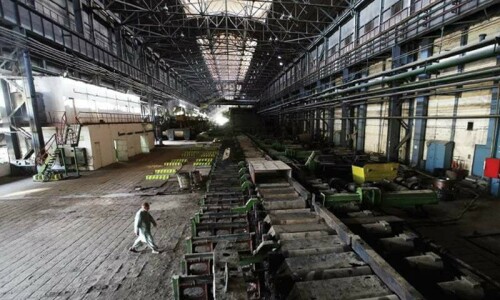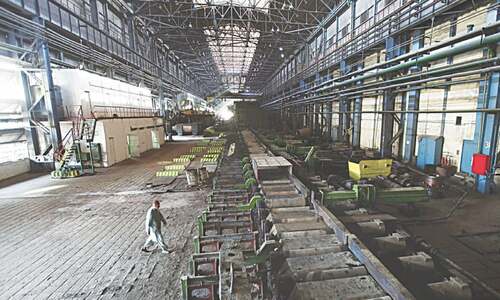ISLAMABAD: After removing Pakistan Steel Mills (PSM) from the privatisation list, the government has assigned its management consulting to Pakistan Institute of Management (PIM) to re-evaluate core and non-core assets along with legal, fiscal and human resource liabilities, but not before losing more than $18 billion in over eight years of closure.
“The purpose of this (Management Consulting) assignment is to assess and report on various aspects of PSM’s operation including housing societies, contractual agreements, legal matters, human resources, assets and inventory,” said an office order issued by the Ministry of Industries and Production (MOIP). Under the terms of reference (TOR), the PIM, an organisation under the MOIP, is required to cover at least seven critical areas, including assets, liabilities and legal and fiscal challenges.
The PML-N government closed PSM in June 2015, except for keeping the main plant on heat mode. It was removed from the privatisation list by the caretaker government last month. Since PSM’s closure in June 2015, the country has lost an estimated $18 billion in foreign exchange for import of steel products that were once produced by PSM.
While PIM claims to be providing consulting services in many areas, this would be its first such an assignment to provide a 360-degree view of PSM-like mammoth organisation. The MOIP’s top delegation would be rushing to Karachi to identify problems and address them as the PIM had reportedly been given “a very short time window and too big an assignment,” said a senior government official.
PIM to review real estate, assets and legal aspects
For example, PIM is required to conduct an extensive review of PSM’s real estate properties, including Steel Town and Gulshan-i-Hadeed to list total number of houses, categorising their sizes, identifying their occupants assessing utility consumption such as electricity, water and gas, and evaluating their costs and liabilities.
In addition, TORs also include appraisal of all assets of PSM Corporation, including physical assets, equipment details, and infrastructure information. This is in addition to inventory management, including the current level and types of materials, as well as the types and quantities of supplies and products in stock, is also required.
Additionally, the institute is tasked with conducting a detailed examination of the current collective bargaining agent (CBA) contract between PSM and its labour force and evaluation of their terms and conditions besides analysing the implications of the CBA on the organidation’s operations.
The PIM is also required to investigate the legal aspects of PSM, including a comprehensive account of the nature and status of legal cases, categorised by the relevant courts and offering insights into potential legal obligations and liabilities. Despite having less than 600 staff members at present, another TOR required it to assess human resources function, including determining the total strength, categorised with their employment status like permanent, daily wage and contingent along with department-wise distribution.
On top of this is the financial statement analysis to provide insights into the financial health and performance of the organisations. Interestingly, the latest financial statement, finalised in May this year showed that PSM earned about Rs7.45bn net profit after tax in fiscal year 2021-22 ending June 30, 2022 despite the fact that its accumulated losses of Rs206bn exceeded its assets worth Rs195.5bn.
Yet, the total assets of the country’s largest industrial unit have been valued at about Rs839bn as of June 30, 2022, up 65pc over Rs549bn a year earlier, according to the company’s audited accounts for fiscal year ending June 30, 2022. Based on audited accounts, the company paid the salaries for April of its employees from its own resources.
In a qualified opinion on financial statements, the independent auditors, Crowe Hussain Chaudhry & Co, said that PSM fully disclosed its gas payables at about Rs59.7bn.
The audited accounts put the company as a ‘going concern’ as the management believed that even after transfer of its core assets to its corporate entity — Steel Corp — will still be left with assets worth over Rs700bn that would be more than sufficient to meet all its expenses. PSM’s total assets valued at Rs838.66bn included Rs751bn worth of property, including over 17,000 acres of land, thousands of houses, many hospitals, educational facilities etc, plant and machinery and Rs71bn worth of investment property besides other current assets in the shape of stocks, receivables etc.
Published in Dawn, November 6th, 2023













































Dear visitor, the comments section is undergoing an overhaul and will return soon.